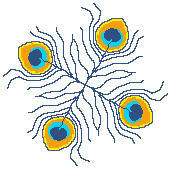peacock eyes
I've learned the perfect magic of your eyes;
I've lit my soul's own candle with your love.
Let evil eyes not look upon my state;
My own eyes look nowhere but at your face.
#1126: From Rumi's Kolliyaat-e Shams-e Tabrizi
I woke this morning to a vision of peacock eyes, small eye-like spots that can arise in the field of vision. There were many Rumi verses containing eyes but I chose this one for its magic.
There is a stage in the alchemical opus which has been described using the imagery of the peacock which has a majestic appearance and seems to trail so many eyes. It is a moment when insights seem to pour out of the psyche in a dazzling display.
Nature photographer Roger N. Clark has a glittering (but copyrighted) photo [75Kb] of a peacock with its "eyes" on display. I have used this and similar photos to create my own peacock eyes and set them into an abstract arrangement.

Getting back to Rumi's verse, this one is not rhyming and a little awkward so I'm guessing that Zara Houshmand, the translator, found this one difficult to render into English poetry. There is a hint of paranoia in the third line, suggesting that some people around him were disapproving of Rumi's intense love for Shams and grief at his loss. Perhaps too, his poetic outpourings were frowned on. Certainly, the Qur'an expresses Mo's ambivalence regarding poetry. Astonishingly, in the very Chapter or Surah titled "The Poets" (26. ash-Shu`ara'), Mo characterises poets as deceivers who say one thing and mean another.
Qur'an 26:220-226 (Pickthall)
Lo! He, only He, is the Hearer, the Knower.
Shall I inform you upon whom the devils descend ?
They descend on every sinful, false one.
They listen eagerly, but most of them are liars.
As for poets, the erring follow them.
Hast thou not seen how they stray in every valley,
And how they say that which they do not ?
Mo was also angry and defensive because he was accused of being a mere mad poet himself.
Qur'an (Pickthall)
21:5 Nay, say they, (these are but) muddled dreams; nay, he hath but invented it; nay, he is but a poet. Let him bring us a portent even as those of old (who were God's messengers) were sent (with portents).
37:36 And said: Shall we forsake our gods for a mad poet ?
52:30 Or say they: (he is) a poet, (one) for whom we may expect the accident of time ?
69:38-43
But nay! I swear by all that ye see
And all that ye see not
That it is indeed the speech of an illustrious messenger.
It is not poet's speech - little is it that ye believe!
Nor diviner's speech - little is it that ye remember!
It is a revelation from the Lord of the Worlds.
I'm inclined, therefore, to read Rumi's quatrain in the light of his having discovered his vocation as poet and mystic, as an authentic messenger of God. Shams had that spark and had to be destroyed. Rumi found a way to keep communicating while keeping safe from the evil eyes that would impede him. Anyone attempting deep cultural change, a profound transformation of collective consciousness, must tread carefully like this. After what happened to Rushdie and more recently to Theo van Gogh, anyone who suggests that the Qur'an is anything but the perfect word of God is treading on dangerous eggshells. Rumi used a poetic mask, I use internet anonymity.



0 Comments:
Post a Comment
<< Home